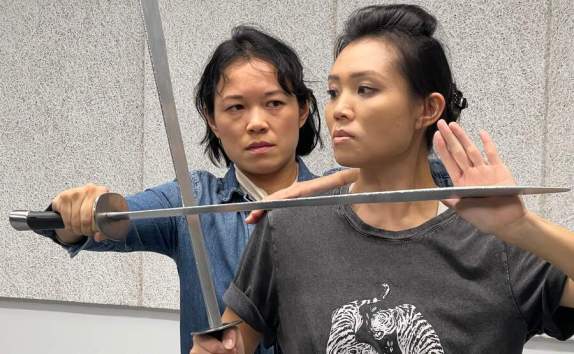Nancy Ma and Kim Wuan in rehearsal for “The Warrior Sisters of Wu.” (Photo by Ariel Estrada)
At auditions for Damon Chua’s new play Warrior Sisters of Wu, actors not only had to capture the humor and ferocity of Wan and Qing, two of the most desired women in ancient China—they also had to show off their swordplay and kung fu skills. The play, after all, opens with spurs flying in the dark as the sisters spar, and the fight goes on from there. Still, acting was paramount. As actor and fight master Michael G. Chin, who serves as the show’s fight choreographer, put it, “There’s no CGI onstage, so we have to adapt to the actor’s skill. It’s easier to teach an actor how to fight than a fighter how to act.”
Chua’s modern feminist adaptation of the 120-chapter 14th-century Chinese epic Romance of the Three Kingdoms—about how the collapse of the Han dynasty led to the division of the country into the Wei, Shu-Han, and Wu kingdoms—was commissioned by Pan Asian Repertory Theatre and will premiere Feb. 7-March 10 at ART/NY. “It’s like adapting the Old Testament, The Iliad, or The Odyssey—I could spend my life adapting Romance of the Three Kingdoms,” said Chua.
He finally honed in on a short but significant part of the book, about two sisters in the southern Wu empire who vie with male generals and various suitors on the eve of war. Incorporating elements reminiscent of Much Ado About Nothing and Pride and Prejudice, it’s a story about strong, fierce women who fight for their country and determine their own destinies—which may explain why these women have become popular video game characters in the 21st century.
“The events are 200 A.D. and the novel was written in the 1300s, but a lot of it feels relevant,” said director Jeff Liu. “Look at our own Supreme Court here—it’s an ongoing story about power and gender. Each culture has its own karmic path to work through.”
Onstage, though, the characters turn the drama on its head with a mix of quippy one-liners and kickass comedy. Said Chua, “You have to lighten it up by having something people can understand and grab onto. Like the yin-yang symbol, it’s a matter of balance.”
Kelundra Smith (she/her) is managing editor of American Theatre.
